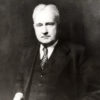calsfoundation@cals.org
James Monroe McHaney (1918–1995)
James Monroe McHaney, a Little Rock (Pulaski County) native who graduated from law school in 1942, was recruited in 1946 to participate in the trials of German Nazi war criminals after World War II. In his obituary in the New York Times in 1995, he was lauded for his success as a prosecutor at the Nuremberg trials.
James McHaney was born on April 23, 1918, one of the six children of Edgar L. McHaney, who was later an Arkansas Supreme Court justice, and Gail Myers McHaney. After receiving both a bachelor’s degree and a law degree from Columbia University, he joined a New York law firm. (This was during World War II, but he was determined physically unqualified for military service.) He married Marilyn Newsom in 1943. They were both from Little Rock but first met in New York, where she was studying. They had two children, James M. McHaney Jr. and Frances McHaney (later Frances McHaney Allen).
In 1946, the victorious Allied Forces put on trial the Nazi military and other leaders accused of war crimes. The first trial was conducted by an international military tribunal, which convicted Hermann Goering and other high-level Nazi military leaders. Subsequent trials were conducted by separate American, British, and French tribunals. The American Chief Counsel appointed McHaney as the lead prosecutor for the first American trial, in which twenty-three doctors, scientists, and medical administrators were prosecuted for crimes against humanity for their treatment of concentration camp prisoners. While the young prosecutor with limited law experience may not have intimidated the defendants and their lawyers, he was more than their equal in performing his duty.
He was also aided by the defendants themselves, as he had access to the detailed records they had kept of the various “medical experiments” performed on prisoners. Among the experiments he revealed were the deliberate infection of subjects with fatal diseases; the killing of 275,000 elderly, deformed, and other “useless eaters” through the guise of euthanasia; and the killing of 90 or more Jews to fill out a university’s skeleton collection.
He described a report on the killing of Jews at Dachau by submerging them in frigid water or tying them naked outdoors in subfreezing weather as “the most startling, and most succinct report on murder in the history of criminology.” The defendants argued first that they were merely following orders and were not responsible. They further argued that the experiments were justified because they added to vital medical knowledge, such as the body temperature at which death occurs.
Sixteen of the defendants were convicted by the judge’s tribunal, and seven of them were sentenced to death. Following his promotion to Deputy Chief Counsel, he oversaw three other trials involving the notorious Schutzstaffel (SS) and the German military high command, resulting in thirty-nine convictions, including three death sentences.
His wife, Marilyn McHaney, had accompanied him to Germany and was on the staff of the prosecution team. In 1948, they were flying in a military plane from Berlin to Nuremberg when it lost an engine. They parachuted out, and he landed on the flat roof of a building in the American sector of Berlin and she on the muddy bank of a river in the French sector. The only injury was Marilyn’s sprained ankle.
In 1948, in an address to the Little Rock Rotary Club, McHaney explained the legal justification of the trials, which had been criticized by some as the prosecution of the “vanquished by the victors.” His response was that the defendants were tried not because they were citizens of a defeated nation, but because they had committed heinous crimes and were no more “vanquished” than any ordinary murderer. The accused were granted every opportunity to present a public defense, have counsel of their choice, and call and cross-examine witnesses. McHaney said, “Far from being a precedent which condemns the leaders of any nation to the vengeance of an oppressive victor, it is a bulwark against that very possibility; it is the landmark of fairness and impartiality unequaled in the annals of international penal jurisprudence.”
After conclusion of the Nuremberg trials, followed by service in Washington DC as general counsel for a federal agency, he returned to Little Rock permanently in 1952 and began a successful private law practice with his brother, Edwin L. McHaney. He retired in 1988 and died on April 13, 1995, at the age of seventy-six. His widow died on October 20, 2017.
For additional information:
Deane, E. C. “Mr. McHaney Plays Important Role in Nuremburg Trials.” Arkansas Gazette, May 30, 1948, p. 15B.
James M. McHaney Collection. Butler Center for Arkansas Studies, Central Arkansas Library System. Little Rock, Arkansas.
Obituary of Marilyn Newsom McHaney. Arkansas Democrat-Gazette, October 24, 2017, p. 4B.
Taylor, Telford. Nuremberg Trials: War Crimes and International Law. Washington DC: Carnegie Endowment for International Peace, 1949.
Thomas, Robert M. C. G., Jr. “James M. McHaney Dies at 76; Prosecuted Nazis at Nuremberg.” New York Times, April 25, 1995, p. 25. Online at https://www.nytimes.com/1995/04/26/obituaries/james-m-mchaney-dies-at-76-prosecuted-nazis-at-nuremberg.html (accessed October 5, 2018).
W. W. Satterfield
Little Rock, Arkansas
 Law
Law McHaney, Edgar Lafayette
McHaney, Edgar Lafayette Military
Military World War II through the Faubus Era, 1941 through 1967
World War II through the Faubus Era, 1941 through 1967




Comments
No comments on this entry yet.